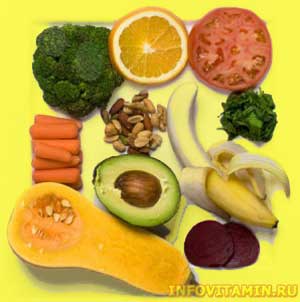Potassium — role in the body, indications for use, contraindications, food sources of potassium
If you have hypertension, you certainly abstain from salt as much as possible. We advise you to consume more potassium at the same time — this is an excellent tool to combat high blood pressure.
Potassium — what is it?
 Potassium. |
Potassium in terms of the amount in the body ranks third after calcium and phosphorus. It is represented exclusively by positive ions dissolved in water (almost all of them are inside cells) and refers to electrolytes. This term means any substance that dissociates into charged particles in solution, but in physiology and medicine it has a specific meaning. This is the name of the ions that play the main role in determining the total positive or negative charge of the medium. In our country, it depends mainly on the ratio of potassium, sodium and chlorine, which, thus, determines the flow of vital processes.
The role of potassium in the body
Together with other electrolytes, potassium participates in nerve impulses, muscle contraction, regulation of heart rate and blood pressure. It «draws» water into the cells, while the sodium outside tries to «pull» it out of them. In the kidneys, they change roles: potassium helps to remove water from the body (gives a diuretic, and at the same time a detoxifying effect), and sodium keeps it in the blood. As a result, they work together to maintain the body's water balance. Potassium also contributes to the transfer of sugar (glucose) circulating in the blood into the form stored in the liver and muscles (glycogen).
| Do you know? |
| Constant physical exertion leads to depletion of potassium reserves in the muscles, so athletes need their constant renewal. |
Prevention
Studies show that potassium-rich foods lower blood pressure, even if you consume a lot of sodium (table salt). For example, out of 54 hypertensive patients, half continued to eat as usual, and the rest received 3-6 servings of high-calorie food daily. A year later, 81% of patients in the second group were able to reduce the doses of antihypertensive drugs, and only 29% in the first group.The main use of potassium
Lowering blood pressure, potassium indirectly protects us from cardiovascular diseases and stroke. It turned out that a high-calorie diet reduces the risk of fatal myocardial infarction by 28%. According to 12-year testing, men whose food is poor in potassium suffer from a heart attack 2-3 times more often than those who consume food enriched with it; in women, the corresponding difference is even more significant — almost 5 times.
| Latest news |
| Judging by the results of 33 studies with 2,600 participants, potassium has a positive effect on blood pressure. For example, an additional daily intake of 2340 mg of this element (with food and/or in the form of supplements) leads to a small but important decrease in it. Moreover, the decrease is most pronounced in those who already suffer from hypertension. |
Indications for the use of potassium preparations
• High blood pressure.
• Prevention of hypertension, coronary heart disease, myocardial infarction, stroke.
Methods of application of potassium preparations
• Doses
 Food sources of potassium are foods with a high potassium content. |
If a diuretic effect is not required, potassium supplements, in general, are not needed. The main thing is to get it with food. By the way, it is absorbed much better in its composition than in the form of purified preparations. Treatment of hypertension or angina with antagonists or inhibitors of angiotensin-converting enzyme (captopril, enalapril, etc.) using potassium supplements is incompatible.
• Reception scheme
At meals, drinking plenty of water to minimize irritation of the esophagus and stomach, which can cause nausea.
Release form
• Liquid
• Powder
• Capsules
| For your information |
| Try to cook vegetables in the microwave or steamed as much as possible, but do not boil them in water. Otherwise, it will draw in a significant part of the potassium. So, only 50% of it remains in boiled potatoes, while in steam — more than 94%. Potassium supplements should not contain more than 99 mg per tablet (this includes multivitamin and mineral preparations). If you think that you need more potassium, discuss this issue with your doctor. |
Contraindications to the use of potassium preparations
• If you have kidney problems or are being treated for hypertension and/or coronary heart disease, take potassium supplements only with the permission of a doctor.
| Caution! |
| • If you are being treated with medications, take any vitamins and minerals only with the permission of a doctor. |
Food sources of potassium — foods with a high potassium content
Fresh and dry vegetables and fruits are very rich in potassium, especially potatoes, bananas, oranges (and their juice), dried apricots. In addition, its sources are not bad — whole grains and dairy products, meat and poultry.
To the section «Mineral substances — descriptions, properties and applications»
•••••••••
